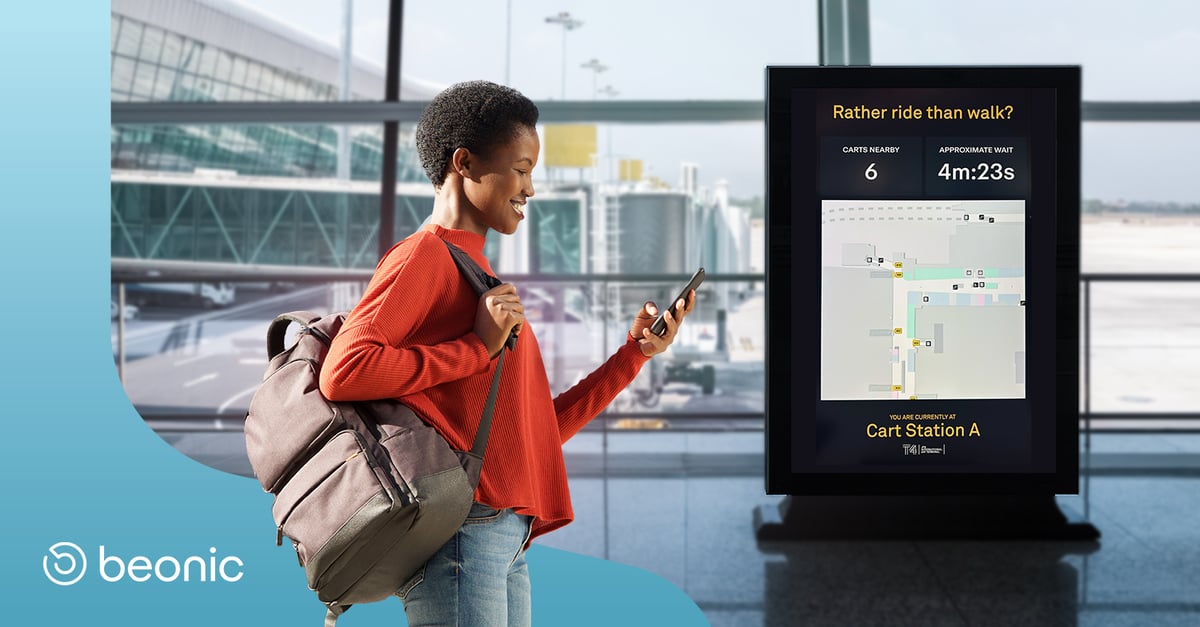Redefining Airport Operations: The World’s First Mobility Cart Tracking Service at JFK Terminal 4

JFKIAT has launched the world’s first airport mobility cart tracking service at Terminal 4, in partnership with Beonic and Volan Technology.
Spanning 2.25 million square feet, roughly the size of 39 US football fields, JFK International Air Terminal 4 is one of the busiest and most complex passenger environments in the world. To help travellers navigate the distance, JFKIAT provides complimentary mobility carts that make designated stops throughout the terminal.
Now, for the first time, those carts can be tracked in real time, allowing passengers to see exact cart locations and estimated wait times on digital displays across the terminal.
From Assistance to Real-Time Intelligence
Mobility carts have long been a vital service, offering complimentary assistance to passengers who need support travelling across long distances. Previously, travellers had no visibility into whether carts were available or how long they would need to wait.
The new mobility cart tracking system changes that. Here’s how it works:
- Volan Technology’s wireless beacon network pinpoints the location of carts with meter-level accuracy throughout both concourses and the Retail Hall.
- Beonic’s analytics platform transforms raw location data into real-time insights: visualisations of cart positions, predicted wait times, and digital display updates at pickup points.
- Operational dashboards provide JFKIAT with unprecedented intelligence on staffing and demand patterns, allowing resources to be shifted dynamically in response to passenger flows.
The impact is twofold: greater accessibility for passengers who need support, and greater efficiency for airport operators managing limited resources.

A Platform for the Future of Airport Intelligence
This technology is a proof point for how real-time tracking, dynamic data displays and AI-driven analytics are reshaping airport operations and traveller experiences at scale.

Scalable Cloud Innovation for Critical Infrastructure
The mobility cart tracking service runs on Beonic’s AWS cloud hosted platform, transforming cart location data into real-time insights. This ensures the system is accurate, scalable, secure, and future-ready.
By leveraging AWS’s global infrastructure, Beonic can:
- Process high-volume location data streams in real time.
- Deliver consistent, low-latency wait-time predictions to digital displays across the terminal.
- Scale infrastructure seamlessly to support additional use cases, from asset tracking to predictive maintenance.
- Maintain the security, availability, and resilience required by mission-critical airport systems.
Setting a Global Benchmark in Airport Technology
The launch at JFK Terminal 4 is more than a world first, it’s a signal of where the airport industry is heading.
Airports that embrace real-time data, scalable cloud infrastructure, and AI-powered innovation will be positioned to thrive in an era of increasing passenger volumes, rising traveller expectations, and large-scale redevelopment projects.
Beonic’s mobility cart tracking service offers a glimpse into the next era of airport operations where data empowers passengers to make informed decisions and analytics drive operational decisions.
About Beonic
Beonic is an Australian technology company and a global leader in advanced solutions for passenger flow management. Using AI sensing technology and real-time data analytics, Beonic helps airports optimise operations, reduce wait times, and improve the overall passenger experience.
With successful deployments at JFK T4, Adelaide Airport, Wellington Airport, London Heathrow, and Zayed International Airport in Abu Dhabi, Beonic is pioneering the future of airport operations with scalable, data-driven technology solutions.
About Volan Technology
Volan Technology provides enterprise-scale real-time micro-location systems to automate complex operational environments, making airports safer, ensuring compliance with FAA security requirements, and optimising budgets. The Volan Positioning System delivers unprecedented productivity, security, and safety across industries including aviation, construction, warehousing, and manufacturing.
Why AWS?
Beonic builds on Amazon Web Services (AWS) to power its suite of solutions with unmatched security, real-time intelligence, and scalability. With AWS, Beonic can securely process large data points in real time, apply AI and predictive analytics at scale for airport operations and deploy securely.
This cloud foundation allows Beonic and JFKIAT to innovate efficiently, reduce wait times, improve resource planning, and expand solutions like mobility cart tracking, queue management, and flow balancing across the terminal.
FAQ: Airport Mobility Cart Tracking and Beonic
What is mobility cart tracking in airports?
Mobility cart tracking is a system that uses wireless beacon networks and AI analytics to monitor the real-time location and availability of airport mobility carts. Passengers can see live updates on digital displays, while airport operators use analytics dashboards to optimize cart deployment and staffing.
How does Beonic improve airport operations?
Beonic uses AI, LiDAR, and predictive analytics to deliver real-time insights into passenger movement and asset utilisation. This helps airports reduce congestion, balance demand, and improve operational efficiency without compromising passenger privacy.
Is JFK Terminal 4 the first to launch this system?
JFK T4 partnered with Beonic and Volan Technology to pioneer the world’s first airport mobility cart tracking service, addressing accessibility needs while setting a new benchmark for global airport operations.
How does AWS support Beonic’s solution?
Beonic’s platform is built on AWS cloud infrastructure, enabling real-time data processing, scalability for future use cases, and enterprise-grade security. AWS ensures the solution can expand to cover more assets like baggage carts, wheelchairs, or ground vehicles.
Which other airports use Beonic technology?
Beyond JFK Terminal 4, Beonic’s AI-powered passenger flow solutions are already deployed at Adelaide Airport, Wellington Airport, London Heathrow, and Zayed International Airport in Abu Dhabi, with more global rollouts underway.

